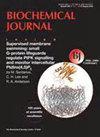EZH2 promotes chemoresistance in colorectal cancer by inhibiting autophagy through NRP1 suppression.
IF 4.3
3区 生物学
Q2 BIOCHEMISTRY & MOLECULAR BIOLOGY
引用次数: 0
Abstract
Colorectal cancer (CRC) is characterized by aggressive tumor growth and chemoresistance, with Enhancer of zeste homolog 2 (EZH2) serving a pivotal role in these processes. However, the mechanisms by which it drives tumor proliferation and therapeutic resistance through autophagy regulation remain unclear. Here, we demonstrated that EZH2 expression is elevated in CRC tissues and cell lines, correlating with chemoresistance and diagnostic potential (Area Under the Curve, AUC = 0.968). EZH2 knockdown markedly reduced CRC cell proliferation, while its overexpression promoted tumor growth and increased resistance to irinotecan. Mechanistically, EZH2 suppressed autophagy in CRC cells, a process linked to chemosensitivity, by directly regulating LC3bI/II expression. Notably, EZH2 enhanced the Neuropilin-1 (NRP1) level by binding to the NRP1 promoter, thereby promoting tumor proliferation and irinotecan resistance through autophagy inhibition. NRP1 depletion partially reversed these effects, underscoring the crucial role of the EZH2-NRP1 axis in CRC. Our findings highlight that targeting the EZH2-NRP1 interaction could represent a novel therapeutic approach to overcoming chemoresistance in CRC.EZH2通过抑制NRP1抑制自噬,促进结直肠癌的化疗耐药。
结直肠癌(Colorectal cancer, CRC)具有侵袭性肿瘤生长和化疗耐药的特点,而EZH2 (Enhancer of zeste homolog 2)在这些过程中起关键作用。然而,其通过自噬调控驱动肿瘤增殖和治疗耐药的机制尚不清楚。本研究表明,EZH2在结直肠癌组织和细胞系中的表达升高,与化疗耐药和诊断潜力相关(曲线下面积,AUC = 0.968)。EZH2敲低可显著降低结直肠癌细胞增殖,而其过表达可促进肿瘤生长,增加对伊立替康的耐药性。从机制上讲,EZH2通过直接调节LC3bI/II的表达来抑制CRC细胞的自噬,这一过程与化学敏感性有关。值得注意的是,EZH2通过结合NRP1启动子提高了Neuropilin-1 (NRP1)水平,从而通过自噬抑制促进肿瘤增殖和伊立替康耐药。NRP1缺失部分逆转了这些效应,强调了EZH2-NRP1轴在CRC中的关键作用。我们的研究结果强调,靶向EZH2-NRP1相互作用可能是克服结直肠癌化疗耐药的一种新的治疗方法。
本文章由计算机程序翻译,如有差异,请以英文原文为准。
求助全文
约1分钟内获得全文
求助全文
来源期刊

Biochemical Journal
生物-生化与分子生物学
CiteScore
8.00
自引率
0.00%
发文量
255
审稿时长
1 months
期刊介绍:
Exploring the molecular mechanisms that underpin key biological processes, the Biochemical Journal is a leading bioscience journal publishing high-impact scientific research papers and reviews on the latest advances and new mechanistic concepts in the fields of biochemistry, cellular biosciences and molecular biology.
The Journal and its Editorial Board are committed to publishing work that provides a significant advance to current understanding or mechanistic insights; studies that go beyond observational work using in vitro and/or in vivo approaches are welcomed.
Painless publishing:
All papers undergo a rigorous peer review process; however, the Editorial Board is committed to ensuring that, if revisions are recommended, extra experiments not necessary to the paper will not be asked for.
Areas covered in the journal include:
Cell biology
Chemical biology
Energy processes
Gene expression and regulation
Mechanisms of disease
Metabolism
Molecular structure and function
Plant biology
Signalling
 求助内容:
求助内容: 应助结果提醒方式:
应助结果提醒方式:


